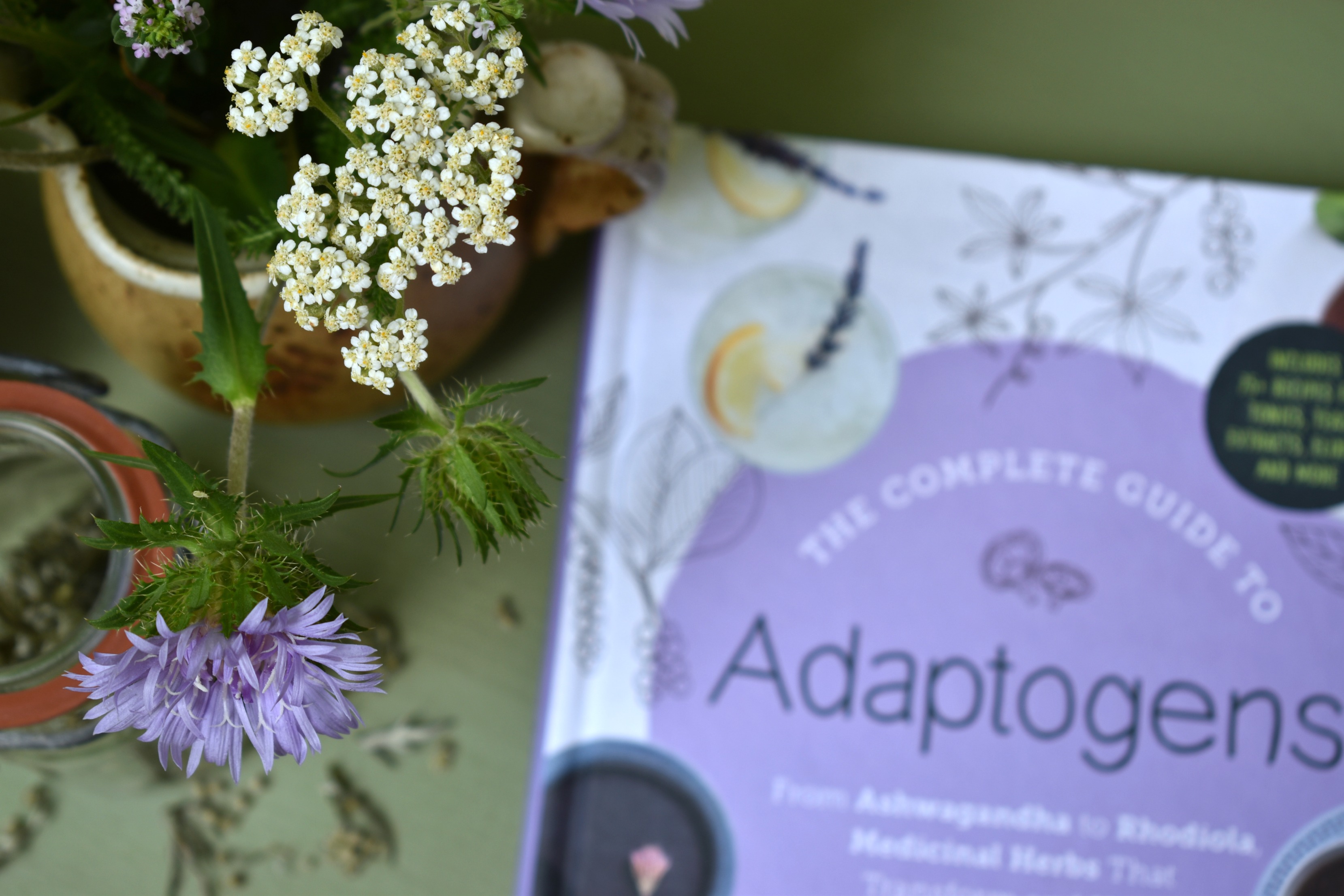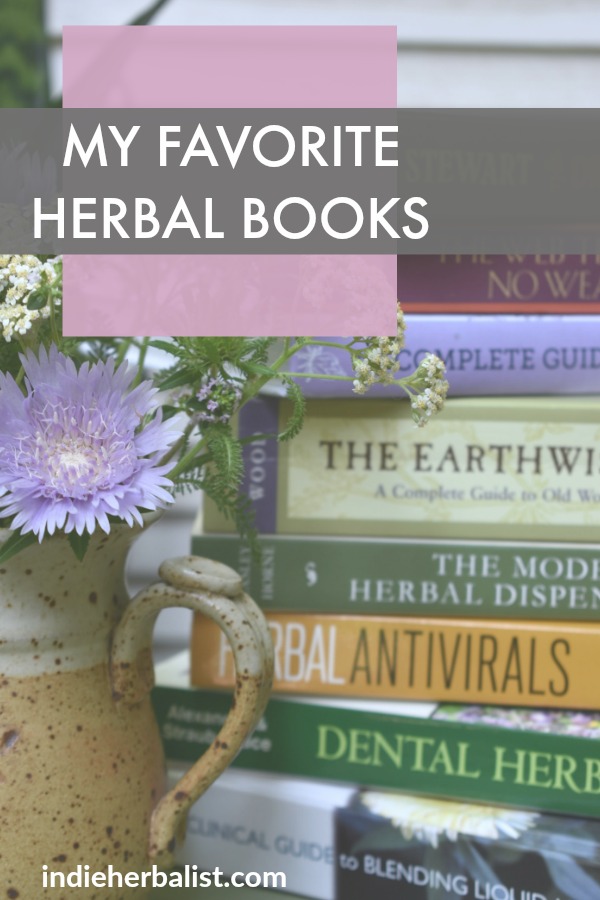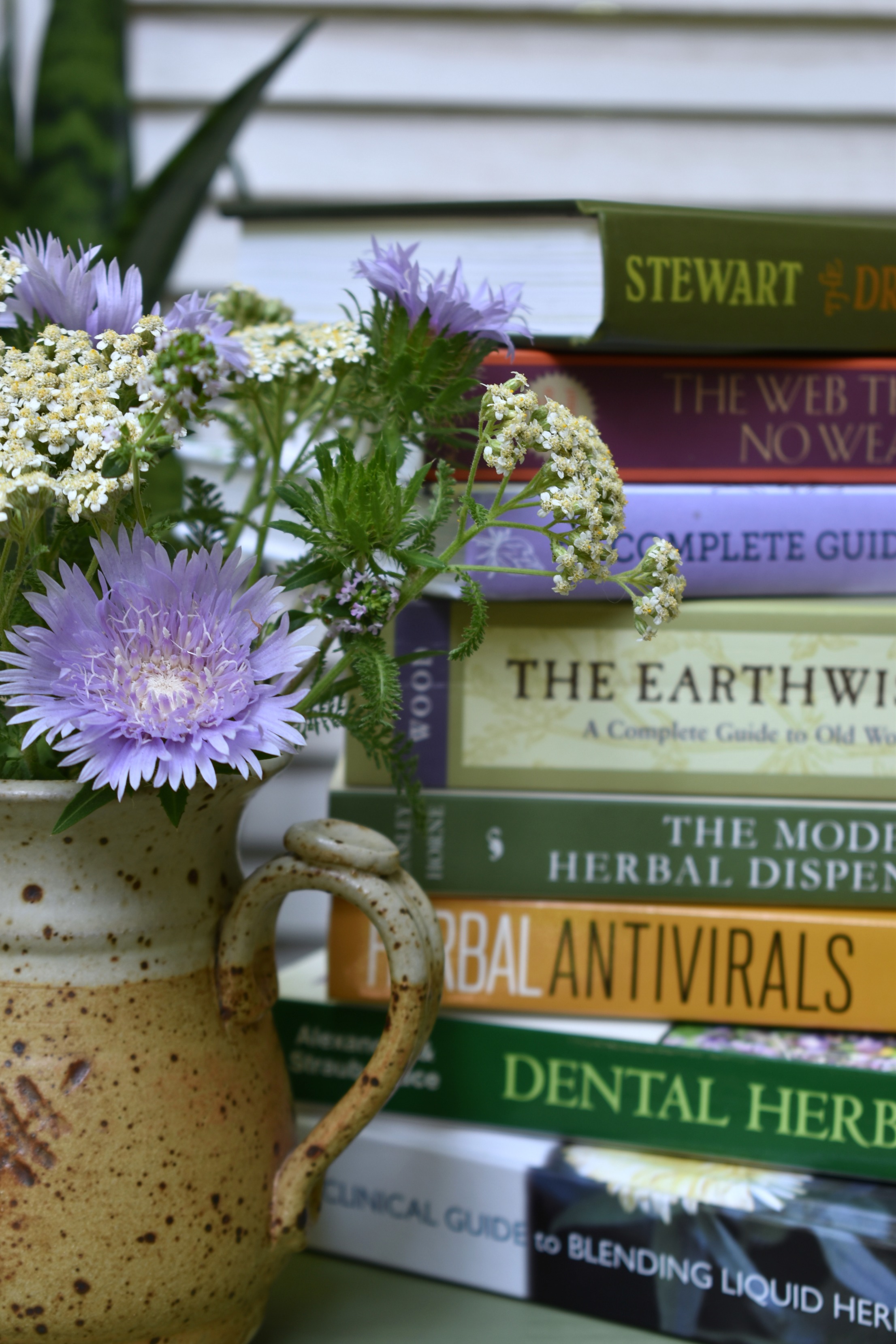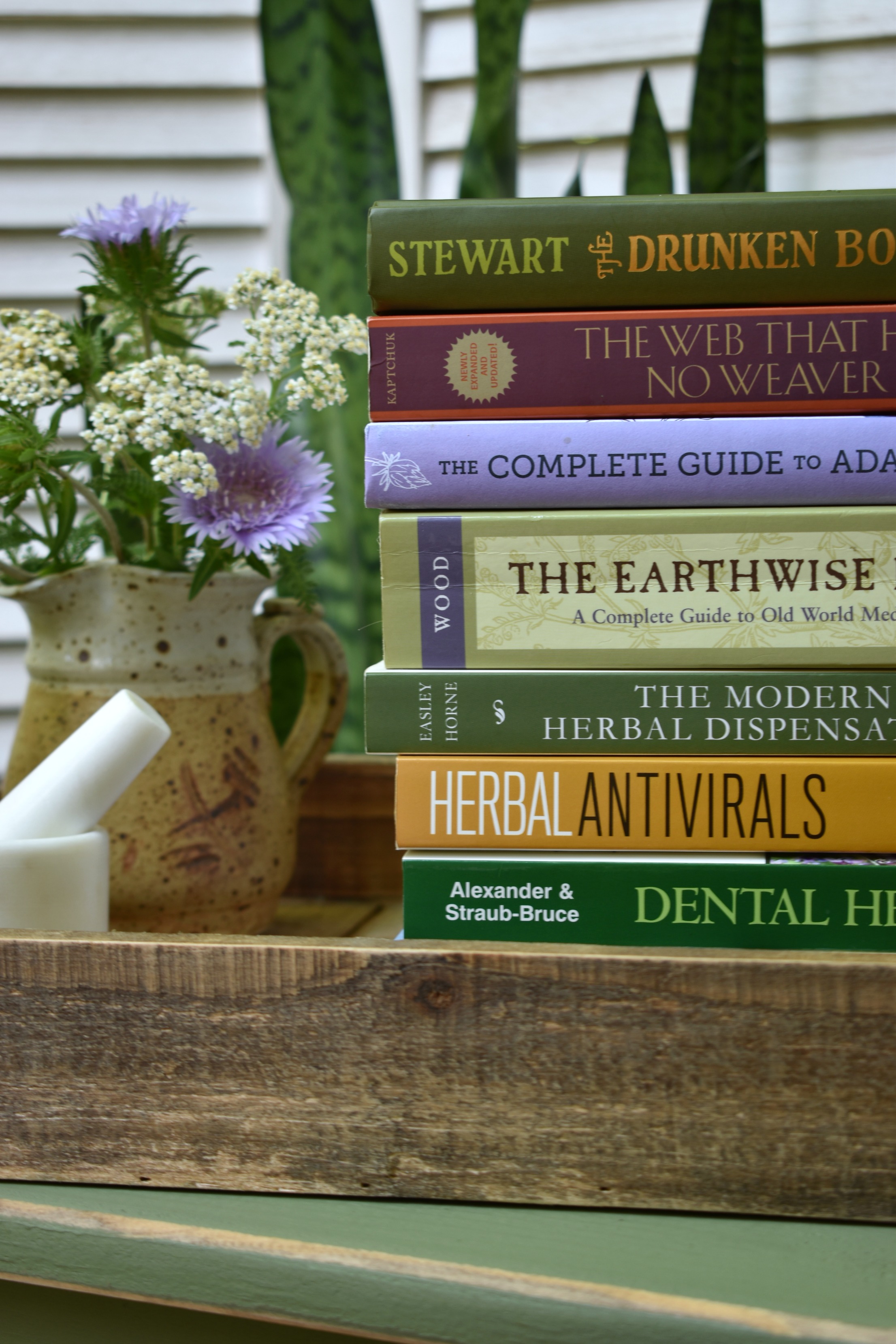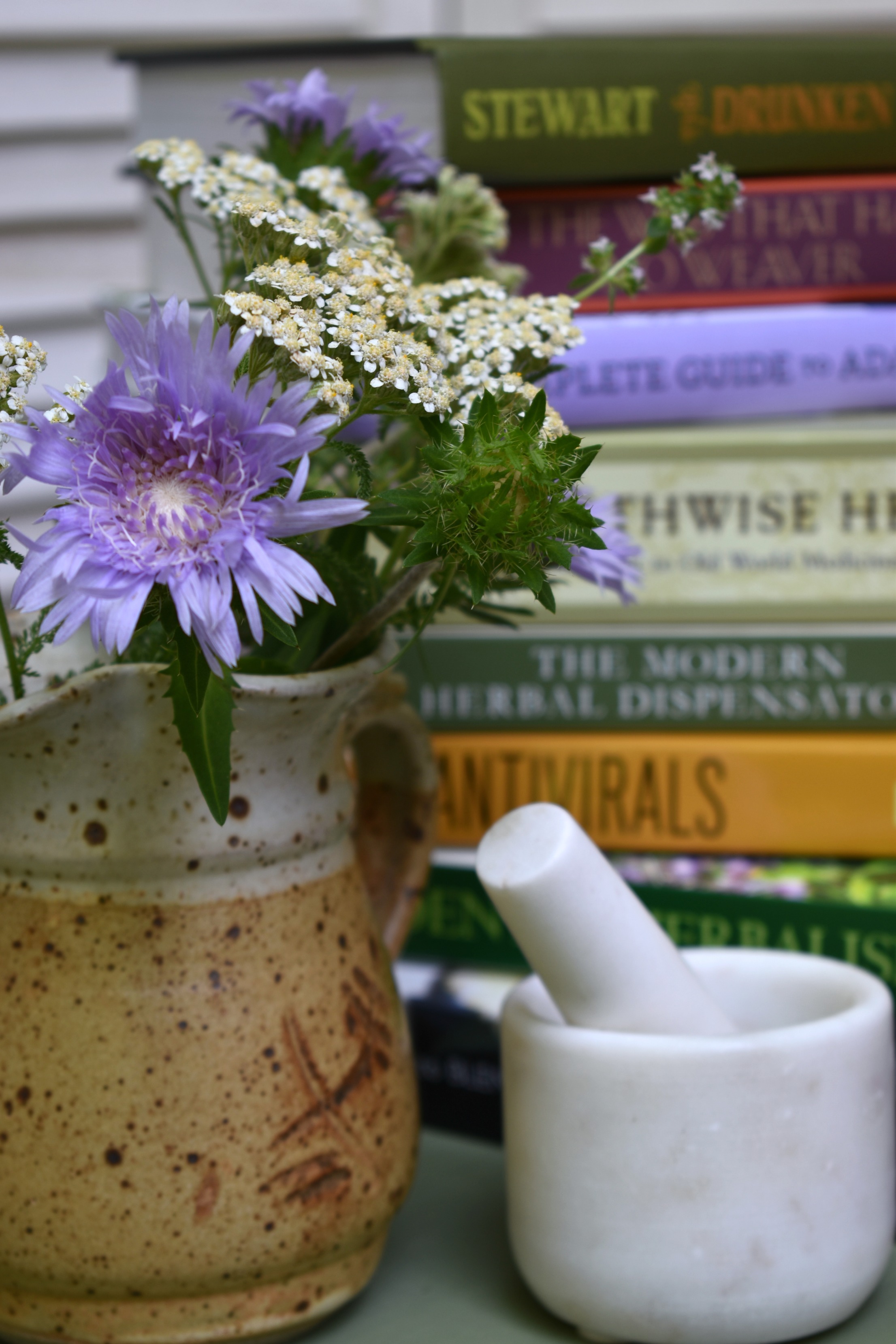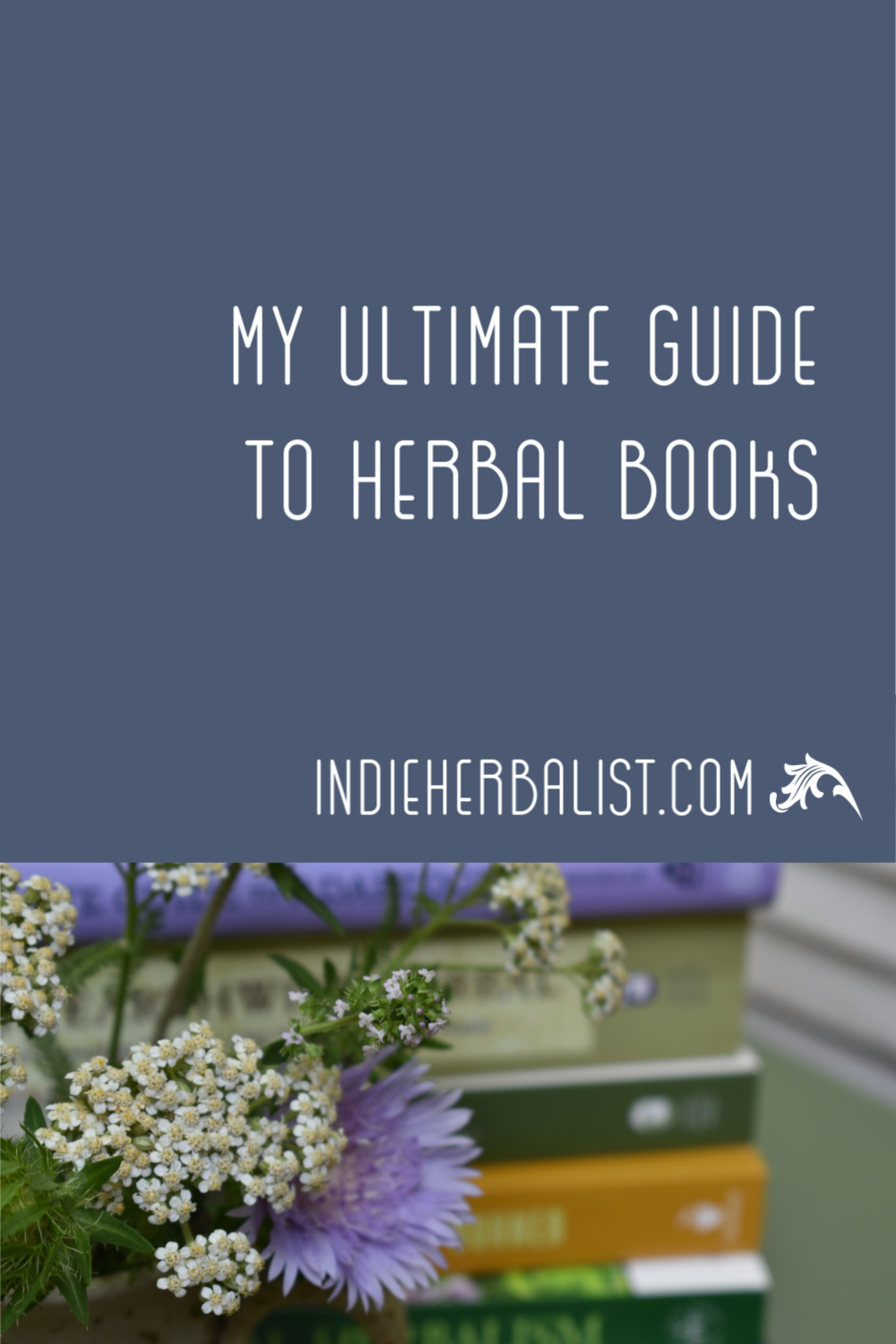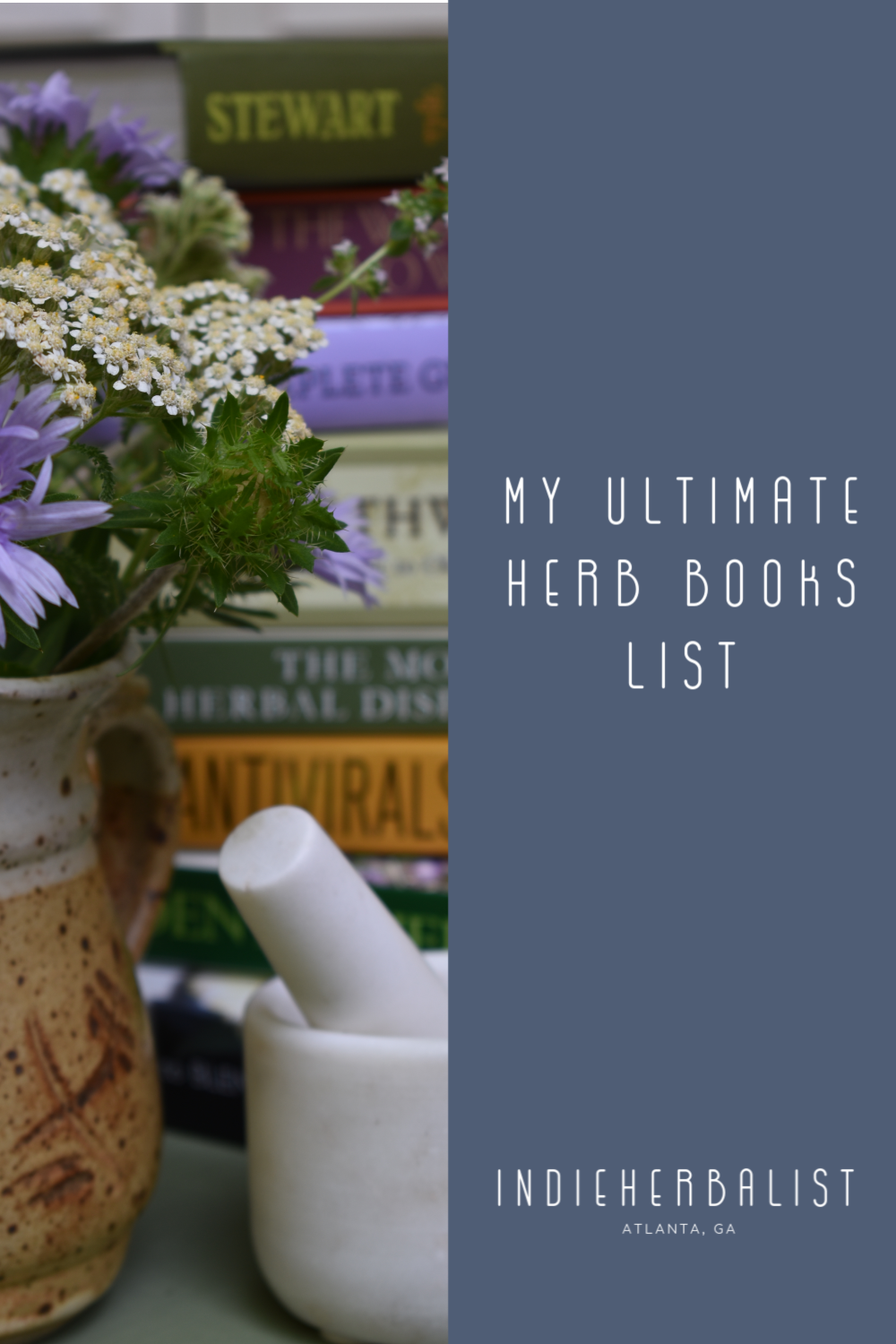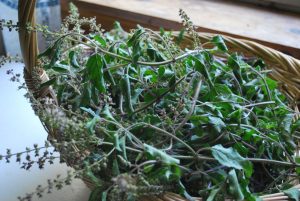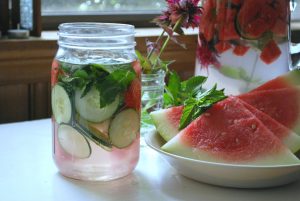Links contained in this post and elsewhere on my website may include affiliate links. When you make a purchase through these links, I earn a commission at no additional cost to you. I only link to products and services that I love - and that I think you will love, too!
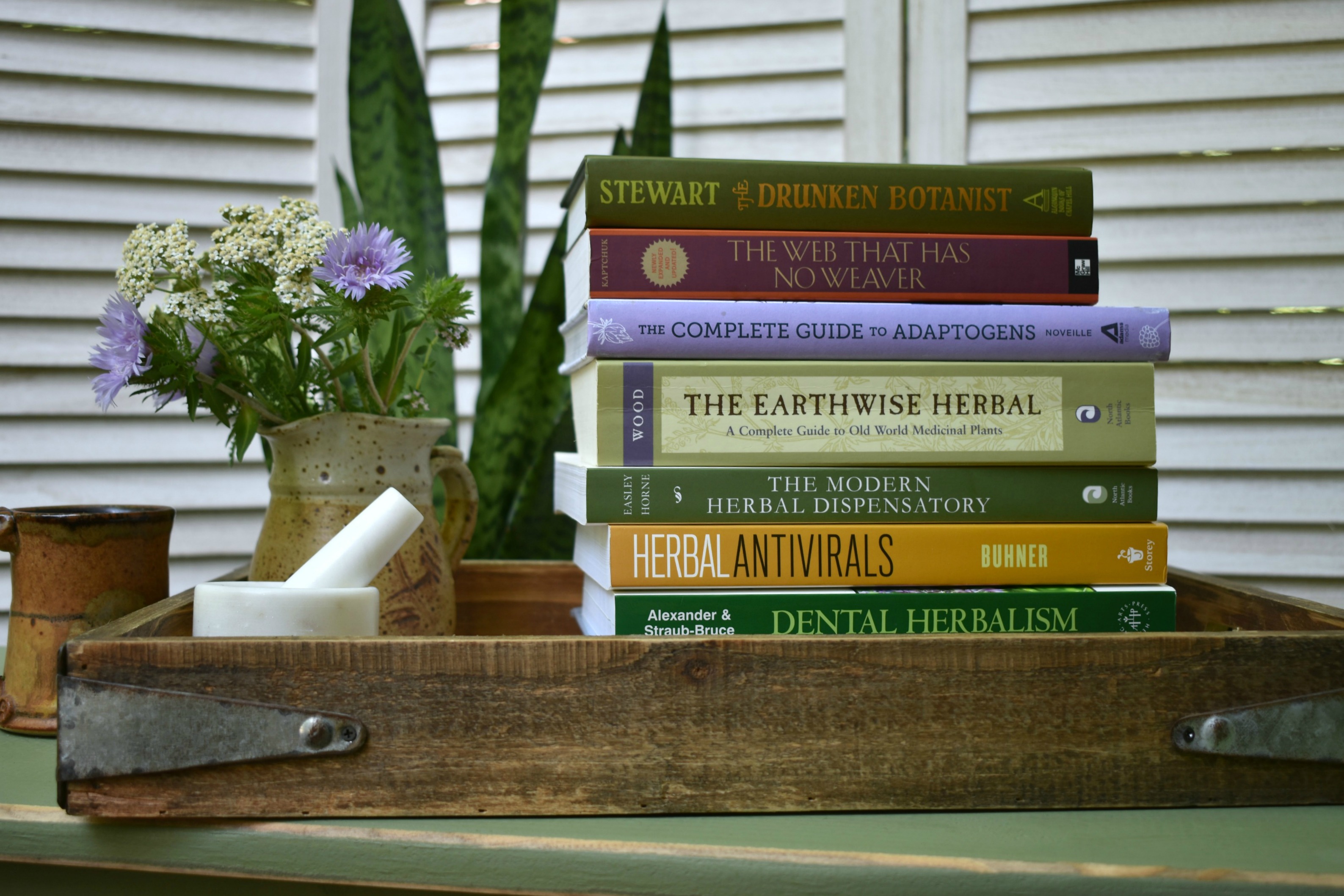
Cultivating a home reference library is essential for home herbalists.The internet makes quite a few excellent herbal resources available, but nothing quite beats the treasure trove that is a collection of good herbal books.
Looking for something new to read? Brew a cup of tea, get comfy, and enjoy browsing my shelves to find your next herb book!
Herbal Books I Love
Does anyone else have a gloriously overflowing home library? I’ve always been a bookworm. My books follow me around the house and I usually have one in the car when I’m out and about. . . just in case. I might have a couple on the table in the kitchen, some on the couch in the living room, a few by the bed, the shelf in the office. . . you get the idea! When I’m not writing or gardening, I’m most likely reading.
So here’s the scoop on a bunch of really great herbal reads, brought to you by an herbalist, author, and voracious reader. I’ve divided everything below into categories and subcategories so you can browse my shelves by topic. You can find them in this order:
- Home herbalism
- Herb book for the whole family
- Herb gardening and farming handbooks
- Foraging manuals
- Materia medica
- Herbal theory
- Clinical herbalism & emergency preparedness
Affiliate Disclaimer: Wherever possible, I’ve used Amazon #affiliate links in the buttons below. I earn commissions through affiliate advertising that helps me keep the blog running. Thanks for supporting my work!
Home herbalism
This category includes the books I think are great assets if you are learning to be your own herbalist. For home herbalism, you will most likely want some good recipe books and handbooks that discuss the finer points of preparing extracts, teas, and other preparations.
The Medicine Maker’s Handbook: A Home Manual by James Green
This is one of my favorite references. It contains step-by-step instructions for making every type of herbal preparation imaginable. Alcohol extracts, oil infusions, glycerites, ointments, salves, lotions and creams, syrups, infused honey, oxymels – they are all in this book, plus so much more! This was the first book that I read on the art of the home apothecary, and it continues to be one of my favorites. An oldie but a goodie!
The Modern Herbal Dispensatory by Thomas Easley and Steven Horne
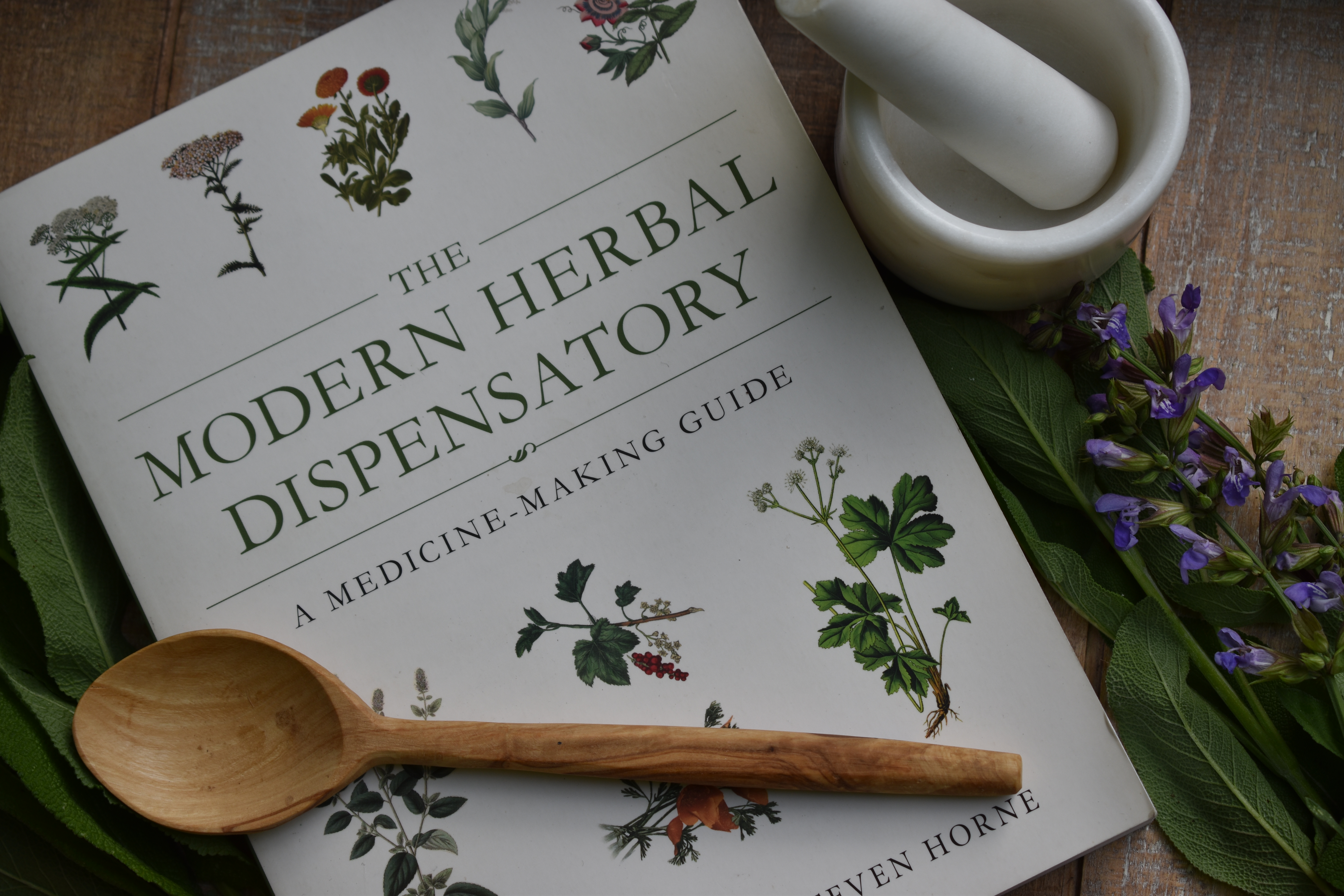
A new primer for making herbal preparations. There’s a chapter on formulation and dosage as well as a chapter of sample formulas. The book includes directions for making fluid extracts and soxhlet extracts. There’s even a chart that discusses categories of herbs (ie demulcent, simple bitters, etc) and how well they are extracted in alcohol, water, glycerin, vinegar, or oil. Directions are all very clear and concise. My complete review is here.
Healing Herbal Teas: Learn to Blend 101 Specially Formulated Teas by Sarah Farr
If you love teas as much as I do, you will thoroughly enjoy Healing Herbal Teas. There are plenty of recipes for supportive herbal teas in the chapters for tonic and remedial teas, but I especially love the chapters on seasonal teas. I’ve bookmarked the Summer Goddess tea recipe – it has tulsi, mint, hibiscus, fennel and chrysanthemum. Sounds divine! It’s a beautiful little book, too! Read my full review here.
Making Plant Medicine by Richo Cech
Full of folksy wisdom and practical experience, this book includes chapters on different types of herbal preparations as well as a short materia medica of herbs that are especially useful in the home apothecary. Plus, it’s really hard not to fall in love with the whimsical line drawings of Cheesy Mouse and company that illustrate the book!
101 Easy Homemade Products for Skin, Health, and Home by Jan Berry
I love this book by The Nerdy Farmwife. She sent me a copy when it was first released and you can read my full review here. There’s so much to love about this book, including the simple but sophisticated recipes, the gorgeous photography, and the fact that essential oils are optional in most recipes. This is a fun one to browse and daydream about your next project!
The Herbal Kitchen by Kami McBride
The Herbal Kitchen is stuffed full of amazing recipes for spice blends, infused oils, special occasion cordials, and all sorts of wonderful culinary creations that use common herbs and kitchen spices. Many of the recipes utilize dried herbs, so no worries if you don’t have a garden for fresh herbs. I have never been disappointed by anything that I’ve made from her book.
Herbcraft: A Compendium of Myths, Romance, and Commonsense by Violet Schafer
This is an adorable vintage booklet filled with whimsical illustrations and folksy entries on the herbal lore of common kitchen herbs. If you sometimes crave the feel of a book for no other reason than books are a little bit magical, then you will love this one. In addition to being a fun read, it’s a pleasure to hold – the pages are thick and the cardstock cover is heavy and textured. My edition is done in brown ink. It’s lovely in a way that so many modern books completely lack.
Rosemary Gladstar’s Medicinal Herbs: 33 Healing Herbs to Know, Grow, and Use
If you aren’t familiar with Rosemary Gladstar’s books, you are missing out! They are infinitely readable and full of recipes and information tidbits. You will want to sit and read it all at one go, and then revisit the pages at your leisure with a cup of tea.
Herbal Recipes for Vibrant Health by Rosemary Gladstar
If you want health supporting herbal recipes galore, this is a great book. It was one of the first herbal recipe books I stumbled upon that brought healing herbs into the kitchen alongside more familiar culinary ones. As with all of Rosemary Gladstar’s books, this one is a treat!
Body Into Balance: An Herbal Guide to Holistic Self-Care by Maria Noel Groves
Once you have dabbled in herbal recipes, the uses of individual herbs and what it means to become an herbalist, it makes sense to explore the concept of holistic wellness and build on what you have been learning about single herbs. Body into Balance does a brilliant job of combining holistic self care with herbs in a way that is readable and relatable. It’s also a fun read for more experienced herbalists simply because it offers a wonderful glimpse into Groves’ wisdom and methods as a practicing herbalist.
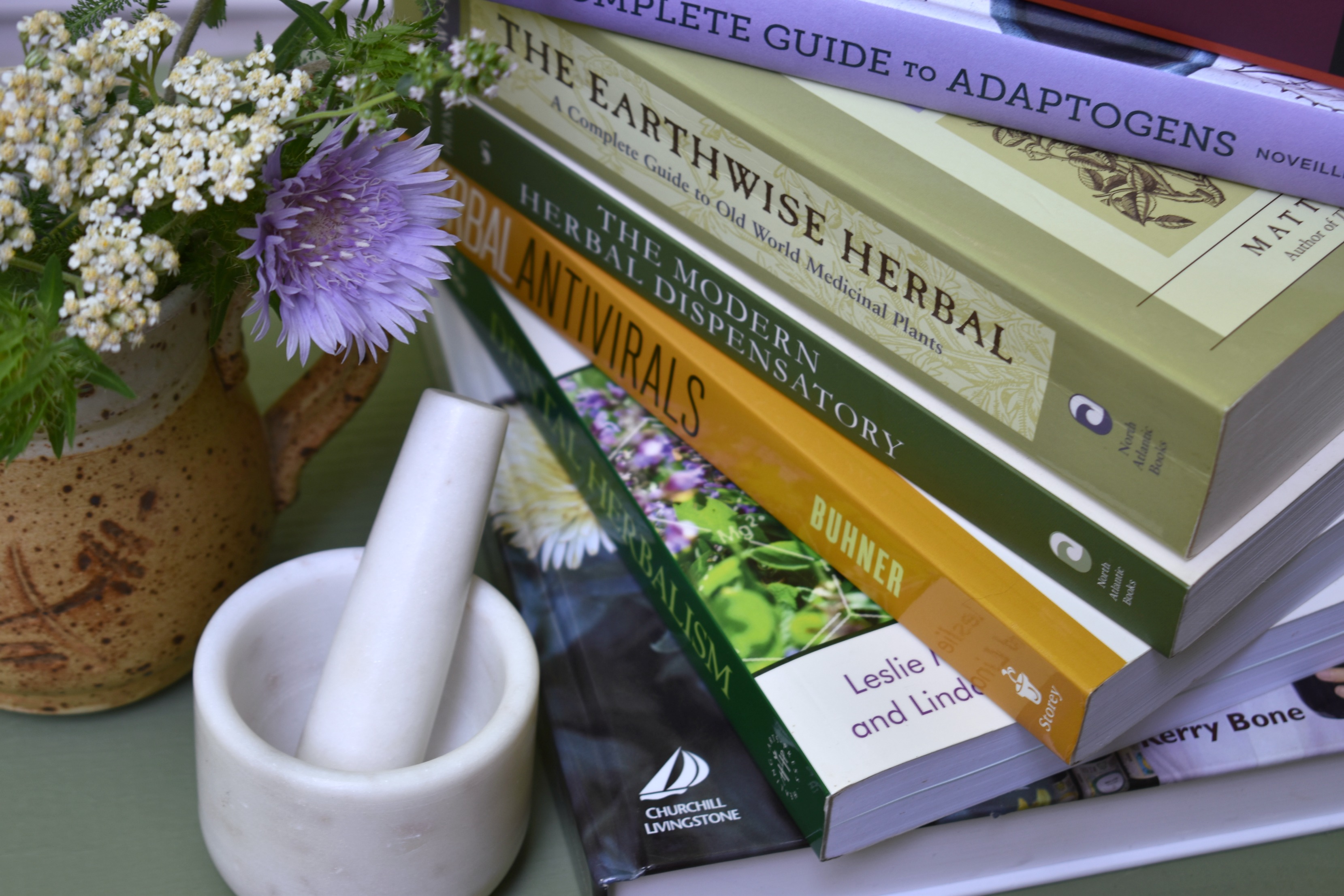
For the Whole Family
Herbal Healing for Women by Rosemary Gladstar
Thankfully, my own health as a woman has been remarkably straightforward, and I don’t have any amazing stories of reproductive health issues that I have had to learn how to overcome. But I still keep a copy of Herbal Healing for Women on my shelf as a useful reference!
Taking Charge of Your Fertility by Toni Weschler
Not technically an herbal book, this has still been an important book on my shelf for natural health so I thought I would include it here. This book covers the topics of natural birth control, fertility, and pregnancy achievement but is very unusual in that it does so by teaching women how to observe their body’s fertility signs by tracking basal body temp, changes in the cervical mucus, and even the position of the cervix. It goes beyond just fertility and birth control, however, and includes chapters on gynecological health and menopause. Women’s hormonal health can seem complex and intimidating, but it doesn’t have to be! This is an awesome resource and one that changed how I relate to my body for the better.
The Male Herbal by James Green
Can’t forget the guys! This is a fantastic, down to earth primer on men’s herbal care. Very readable but packed with information, it deserves a place of honor on the family herbal bookshelf. Wouldn’t be without it!
Rosemary Gladstar’s Herbal Healing for Men
Another excellent herbal resource for men and the herbalists who care about them.
Naturally Healthy Babies and Children by Aviva Romm
I don’t often work with children, but when I do, I typically find that a small handful of gentle herbs are more than sufficient. Naturally Healthy Babies and Children by Aviva Romm was one of the first books I read on herbal care for children, and I really appreciate her straightforward and simple style when it comes to working with little ones.
Herb Gardening and Farming
The Medicinal Herb Grower by Richo Cech
Quirky and fun just like his Making Plant Medicine Handbook, this is a great first reference if you know nothing about gardening or herbs- but it’s also a good reference if you have a few growing seasons under your belt!
Practical Herb Garden by Jessica Houdret
This is a fun reference to have around because of the garden plans and the individual plant profiles. It does lack detail on starting from seed or best propagation methods, but it’s a great quick reference when you need to determine best growing conditions and basic herb facts like whether a plant is an annual or biennial. Unfortunately, I think it’s out of print, but you may be able to find it secondhand.
The Plant Propagator’s Bible by Miranda Smith
Not specifically herbal, but it is a great reference for learning the basic techniques of horticulture like how to start and save seeds, propagating new plants from different types of cuttings, the best ways to divide different types of plants, and even grafting techniques. The best parts about this book are that it has great photographs for visual learners, and that it’s not an encyclopedic tome of horticultural intimidation. Instead, it’s a friendly handbook that you won’t mind grabbing off the shelf when you want to learn a new technique or to refresh your memory. Another one that’s out of print, but I found a copy at my favorite used book shop and highly recommend it!
The Organic Medicinal Herb Farmer by Jeff Carpenter
This is another one that’s on my wish list, since I have checked it out multiple times from the library! It has detailed growing profiles on many popular herbs currently on the market, and specifically deals with topics that every aspiring herb grower will find useful, but especially if you are interested in running your own herb farm. You will need a bit more than just the info from this book to start your dream herb farm . . . but it’s beautiful, thorough, and a great place to start.
The Chinese Medicinal Herb Farm by Peg Schafer
Interested in growing TCM herbs? You’ll love this book! Read my full review here.
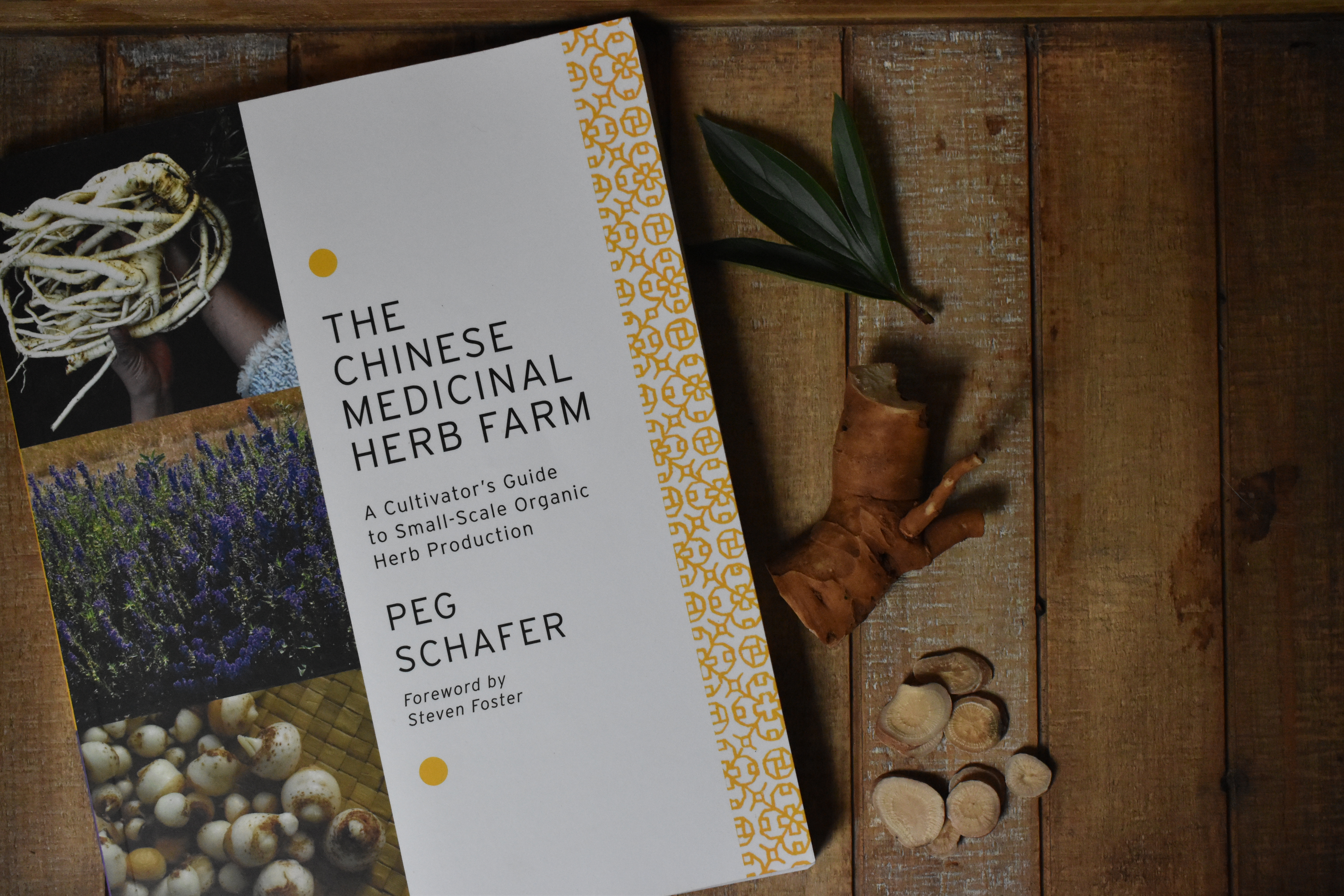
The Herbalist’s Way by Nancy and Michael Phillips
Another one that I have had forever, this is a lovely companion book for anyone contemplating becoming a community herbalist. It features interviews with many different herbalists, plus thoughtful advice and words of wisdom for finding your own path as an herbalist. It’s an encouraging handbook with a unique blend of business savvy suggestions and inspiration for the aspiring herbalist.
Foraging
A few trusty field guides are a must for learning wild plant identification. This section on my shelf isn’t that big presently because I tend to swing by the local library when I need to compare references. Rather than take along a field guide I tend to take pictures in the field and research later.
Field Guide to Edible Wild Plants by Bradford Angier
I bought my original copy (poor, dog eared, falling apart copy) when I was fifteen. It was one of my first field guides. I liked it because the illustrations were better than the photograph based field guides available at the time. It’s a classic.
Backyard Foraging: 65 Familiar Plants You Didn’t Know You Could Eat by Ellen Zachos
A newer field guide specifically for people interested in urban foraging. Detailed plant guides and harvesting information, excellent photos, and a great read! Excellent resource for creating an edible landscape, too. Seriously, did you know you could eat hostas?
Peterson Field Guide to Medicinal Plants and Herbs of Eastern and Central North America by Steven Foster and James A. Duke
I bought my copy at a talk Steven Foster gave at the Atlanta Botanical Garden. It’s good, and I like that it is perfectly sized for a daypack, but not as detailed as some of my other favs. It does have many of the less common plants in it, though, so if you like to hike it’s perfect.
Find it here.
Botany in a Day by Thomas J. Elpel
I’m a bit biased in that I think every herbalist should strive to have at least a very basic literacy in botany and horticulture. It’s incredibly useful and illuminating to begin thinking about herbs from a botanical perspective and in terms of what they need as living organisms. Botany in a Day is a perfect introduction for learning to describe plants in terms of their botanical descriptions – all of the minute and fascinating formal ways to describe how a plant looks and how it is related to other herbs.

Materia Medica
In case you haven’t come across the term before, materia medica are a type of herbal reference characterized by specific entries on individual herbs. These herbal books can be very brief or very detailed, depending on the author and the intended purpose of the materia medica. They make valuable references for obvious reasons, but many of them are also a pleasure to read for the sake of reading.
The Earthwise Herbal: A Complete Guide to Old World Plants Matthew Wood
Matthew Wood has many years of experience as a clinical herbalist, and his materia medica books are a treasure! He draws from his own experience and that of other modern herbalists, as well as historical herbalism to create a vivid picture of each herb’s application and record of use. This volume describes herbs like cleavers, fennel, and shepherd’s purse as well as more familiar herbs like rosemary and thyme – all of them originating in Europe and the “old world”.
The Earthwise Herbal A Complete Guide to New World Medicinal Plants Matthew Wood
This volume of the Earthwise Herbal examines new world plants like goldenseal, black cohosh, and butterfly weed. Once again drawing from many historical and modern sources as well as a wealth of information from practicing herbalists, this book illuminates new world herbs in a depth and richness not found anywhere else.
Herbs Demystified by Holly Phaneuf
This book is a scientific examination of popular herbs. It’s been around for awhile now, so there are probably many more studies available that either support or draw different conclusions from what is presented in the book, but it’s a great place to start and a fascinating read.
Planetary Herbology by Michael Tierra
This was my first materia medica reference. It’s valuable for at a glance information about uses, tastes, and energetics but lacks the depth of entries found in the Earthwise Herbals. I tend to reach for it as a way to quickly refresh my memory on an herb, and typically keep this one in my herb cabinet. It includes herbs from TCM, Ayurveda, and Western herbalism.
The Book of Herbal Wisdom by Matthew Wood
This book reads like a series of personal essays on individual herbs, with illuminating case studies from the herbalist’s practice and personal experience. One of my favorites to curl up and enjoy a cup of tea and a cuddle with the cats while I read it! Did I mention it is a satisfyingly brick sized book? Oh yes. Big, juicy, wonderful book.
Medicine of the Earth: Legends, Recipes, Remedies, and Cultivation of Healing Plants by Susanne Fischer-Rizzi
Another one that I often enjoy with a cup of tea and kitten snuggles. This book is crammed full of lore on Western herbs like Herb Robert, Mugwort, and Ground Ivy. Recipes and project ideas are sprinkled throughout. There are beautiful pencil illustrations in the edition I have. Another oldie but goodie! I think there’s an updated edition out, too, but I haven’t had a chance to get my paws on that one yet.
Herbal Theory
Did you know that there are several well developed frameworks for describing the relationships between herbs and the human body? Herbal theory can be as easy to understand as “simpling” – the use of a single, well-matched herb at a time – or as complex as the immense frameworks of Traditional Chinese Herbalism (TCM) or Ayurveda. There are many other systems and folk traditions in between. Learning to navigate different systems adds finesse to your practice as an herbalist.
Healing with the Herbs of Life by Lesley Tierra
If you want to learn TCM, but are feeling confused, this is the book you need. An astonishing amount of clarity on a topic that some authors seem to take a perverse pleasure in making as complicated as possible. Materia medica section covers many common, accessible herbs (Eastern and Western). The section on The Energy of Illness is one of the easiest guides to understanding Differential Diagnosis that I have seen anywhere. If you can only get one book about TCM, this is the one I recommend, hands down.
Chinese Traditional Herbal Medicine Vol 1: Diagnosis and Treatment by Michael and Leslie Tierra
Once you’re familiar with TCM basics via Healing with The Herbs of Life, you could tackle this one if you wanted. It’s more technical and elaborates more on many of the concepts. Still, rather dense, and not one I have bothered to read cover to cover, but do use it as a reference from time to time.
Find it here.
The Web that Has No Weaver by Ted Kapchuk
This is one that I have read cover to cover. Like Chinese Traditional Medicine Volume 1, it is also pretty dense, but I found it more readable. Actually, a good read – I enjoyed it very much. If you want a good grasp on TCM, start with Healing with the Herbs of Life and then dive into this one!
The Yoga of Herbs by Dr. David Frawley and Dr. Vasant Lad
An introduction to Ayurveda in one neat little package! It’s a handy reference and very readable. There is a chapter on the background of Ayurveda, Ayurvedic herbal energetics, management of the individual constitution, and even a section on methods of preparations and use specific to Ayurveda.
The Practice of Traditional Western Herbalism by Matthew Wood
A really good introduction into the formal framework of Western herbalism. Although Western herbalism sometimes gets knocked for being more simplistic than the highly developed (cough, cough *convoluted*) Eastern traditions, this book restores the Western tradition to its former glory. A good resource to apply more structure to your understanding of Western herbalism.
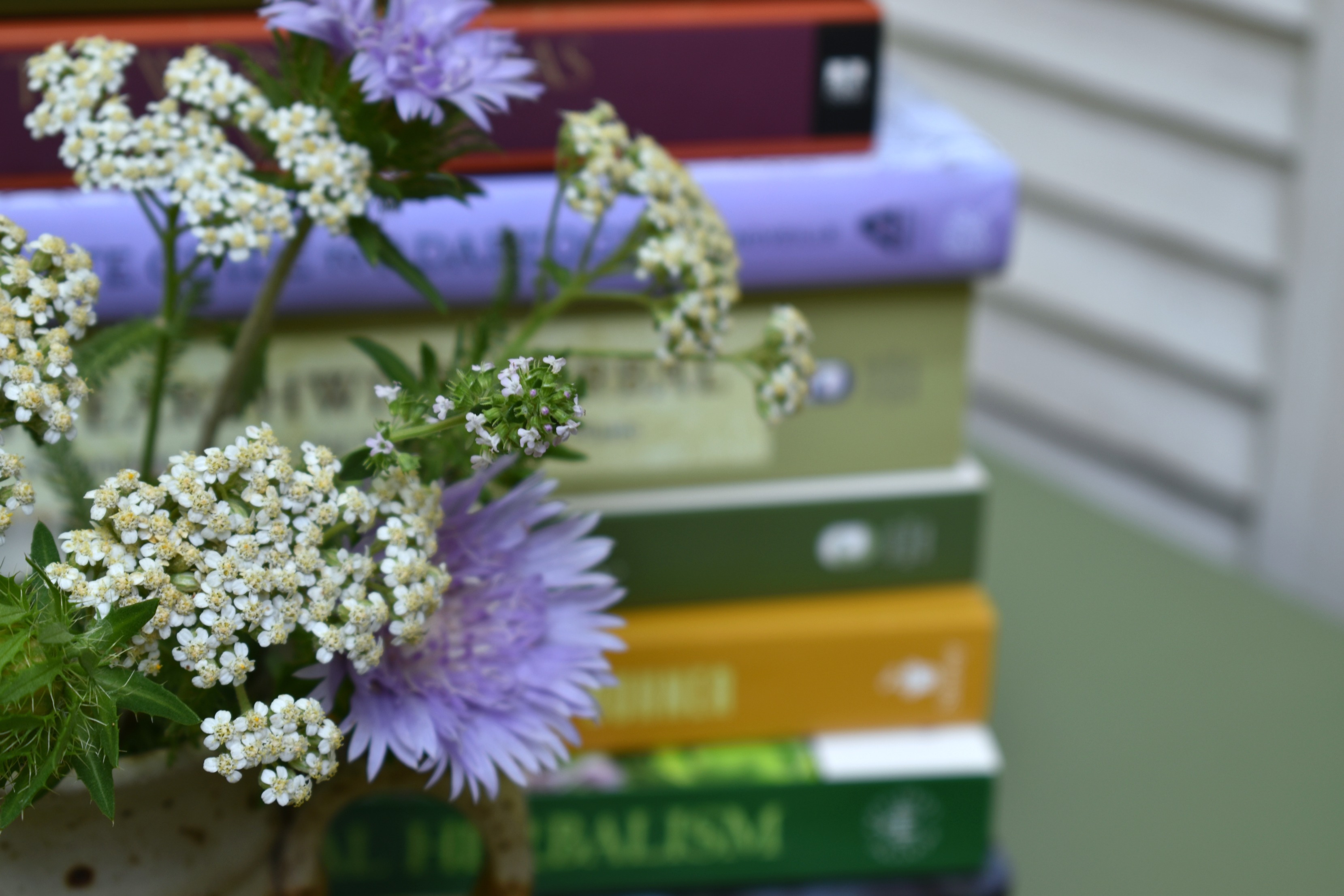
Clinical Herbalism & Emergency Preparedness
Ready to take your herbal skills up another notch and wade into the more technical side of herbalism? Some of these books are textbooks. Some of them are handbooks that are useful to an herbalist branching out into more specific material of greater depth. They are all wonderful references that I highly recommend if you are interested in learning herbalism for emergency preparedness. In a long term emergency, having a strong working knowledge of herbalism would be an asset!
Medical Herbalism: the Science and Practice of Herbal Medicine by David Hoffman
If you want to develop a more clinical/medical understanding of herbalism, start here! This is a hefty but very readable textbook. The first part of the book examines phytochemistry and health by body system. The second part is a materia medica organized by scientific name. I found that helpful, but you may find it annoying if you haven’t learned your binomials yet.
Uses and Abuses of Plant Derived Smoke by M. Pennacchio, L. Jefferson, and K. Havens
This book is expensive considering it’s small size. However, it’s very unique and I think that makes up for the price. The first few chapters are essays on ethnobotany and the use of herbal smoke. The second part is a glossary style format that lists herbs with a record of use as smoke. It includes basic info on the ways they were employed as burnables.
Herbal Antibiotics by Stephen Harrod Buhner
Yeah, I love this one. Probably the BIGGEST “herban” legend out there is that goldenseal can be used like a prescription antibiotic. So. Much. No. If you want to become well versed in the topic of herbalism for drug resistant bacteria, this is your book. If you want to be better informed than the oft-repeated misinformation of antibiotic herbs, this is also your book.
Herbal Antivirals by Stephen Harrod Buhner
Every bit as wonderful as Herbal Antibiotics. An excellent resource about herbal support for communicable diseases. This volume has overviews about specific types of viruses, profiles of important herbs, and suggested protocols.
Dental Herbalism by Leslie M. Alexander
Everything related to the herbs and the mouth! How many of us can say we really understand what goes on in our mouths? This book contains helpful recipes and herbal care suggestions for keeping your teeth and gums in tip-top shape.
American Herbalism edited by Michael Tierra
I picked this one up at a thrift shop, and it’s a fun peek into the minds of some of the early members of the American Herbalist Guild. More or less a bunch of random but very interesting articles on topics as diverse as “Natural Remedies for Ear Ailments” by Brigette Mars; “Herbs and the Mind” by David Frawley; “Nvwote: Cherokee Medicine and Ethnobotany” by David Winston, and “Fragments of Earth Wisdom” by Feather Jones. It’s organized by topic such as Herbal Heritage, Herbalists and Herbal Elders, Using Herbs, and the Practice of Herbalism.
Adaptogens by David Winston and Steven Maimes
The definitive handbook for learning about and working with adaptogens from a clinical perspective. History, actions, and health benefits of specific adaptogens are all covered in detail. The book also contains detailed monographs about each adaptogen. A very good introduction to the topic and excellent reference to keep on hand.
Herb Contraindications and Drug Interactions by Francis Brinker, N.D.
There’s a lot that is simply not known about combining herbs with pharmaceuticals. It’s always good to err on the side of caution. Most herbs in most circumstances, used with skill, won’t cause problems. However, there are several potential ways they can alter the way the body uses or processes prescription drugs. This handbooks gives an overview of potential interactions.
Find it here.
The Earthwise Herbal Repertory: The Definitive Practitioner’s Guide by Matthew Wood
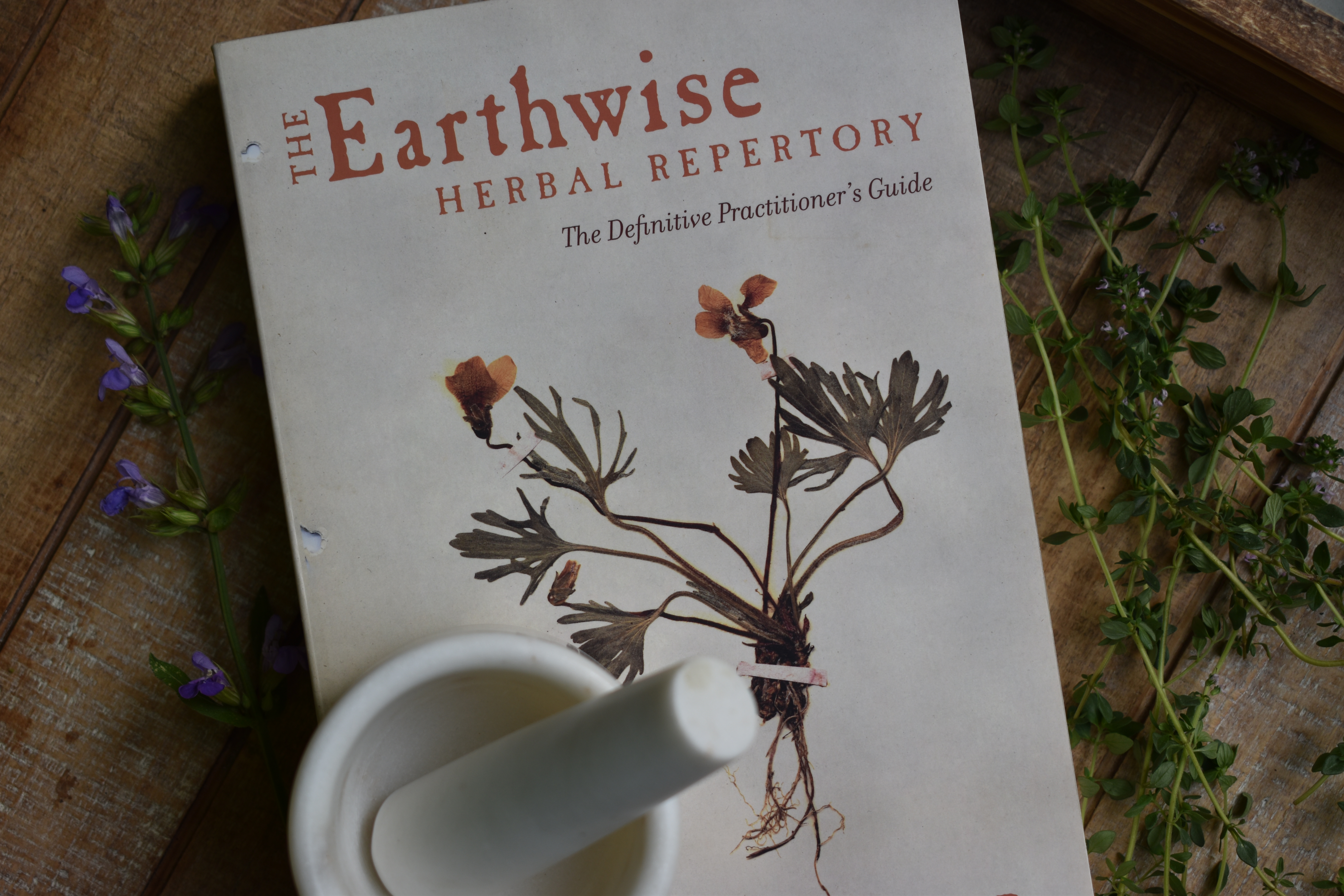
This is a guide for differentiating between multiple herbs with similar uses by way of specific indications. This book is organized by body system and type of imbalance. It’s perfect as a quick reference to keep with your herbal supplies. I have a full review about it here.
Clinical Herbalism and Formularies
Blending herbs as formulas is as much an art as it is a science. Being able to create a formula from scratch is an important skill to have, and studying the formularies of other herbalists can be invaluable.
A Clinical Guide to Blending Liquid Herbs: Herbal Formulations for the Individual Patient by Kerry Bone
The sections Fundamental Concepts, and Formulating for the Individual Patient are both very good if you are looking to stretch into a more clinical approach. The majority of the book is a materia medica that reviews scientific literature and studies about each plant. It’s a valuable resource for a researched-based approach.
Veterinary Herbal Medicine by Wynn and Fougere
Really important reference for anyone interested in being informed about animals and herbalism. It’s easy to over-simplify herbalism, and that’s especially true of veterinary herbalism. It’s a textbook so it’s expensive, but it is absolutely worth it. You can read my full review here.
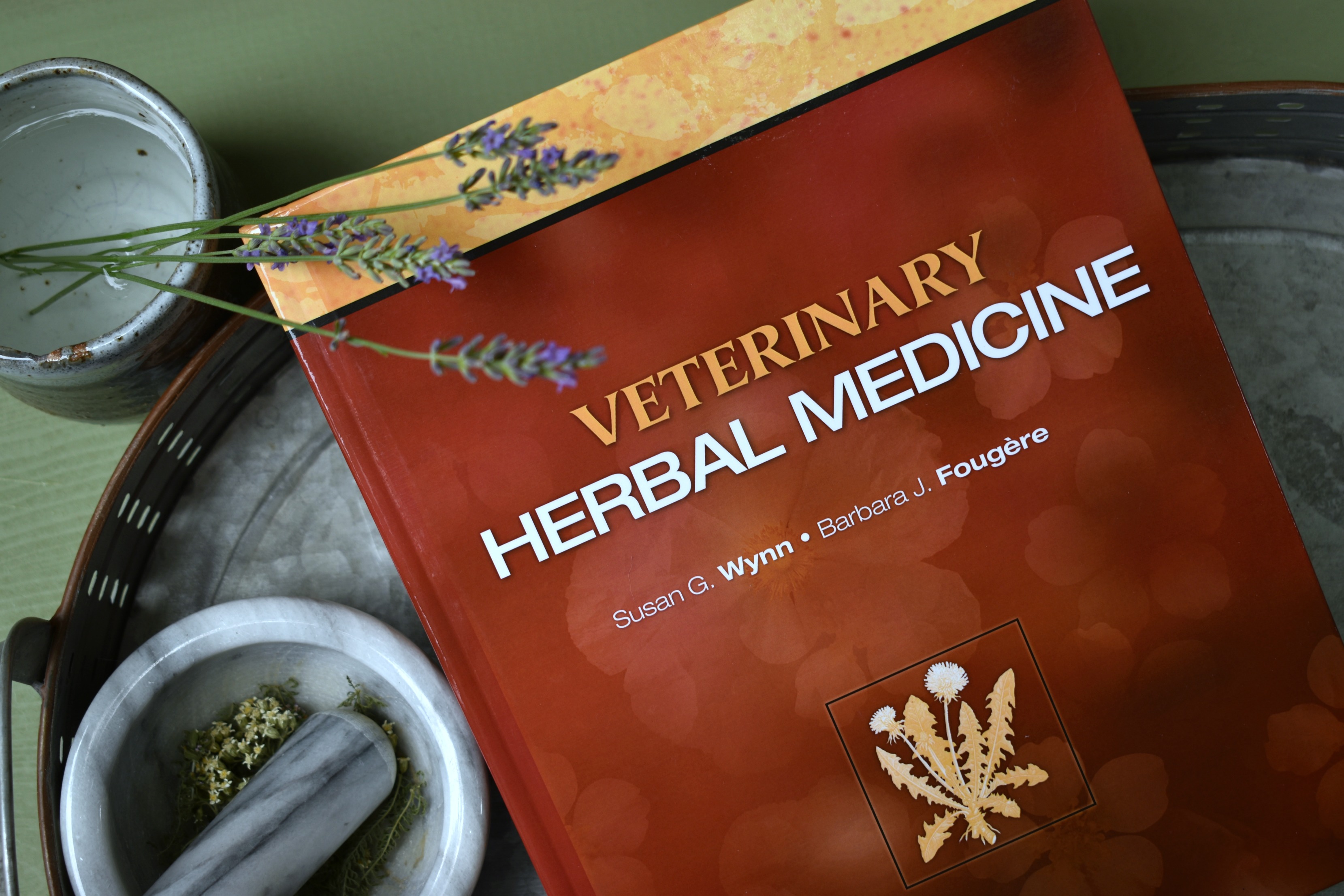
Chinese Traditional Herbal Medicine Vol 2: Materia Medica and Herbal Resource by Michael and Leslie Tierra
Much more in depth than Planetary Herbology and focuses on herbs from the Traditional Chinese Medicine Tradition. Each entry includes a brief overview of the herb’s energy and flavor, organ meridians affected, actions according to TCM theory (ie: Tonifies the Blood, Calms the Shen, etc), and then goes on to list traditional indications and contraindications couched in TCM terms. Dosage and helpful miscellaneous notes are also included. The second part of the book details the complexities of Chinese herbal formulations and covers important formulas and their indications/contraindication along with pulse and tongue signs.
Herbal Medicine from the Heart of the Earth by Sharol Tilgner
Very nice materia medica for Western herbalism written by a practicing herbalist. It also contains many detailed chapters of herbal formulas by body system that make it a fantastic reference for home herbalist and budding practitioner alike.
What’s on Your Reading List?
Did you find a new favorite from browsing my shelves?
I’ll continue to add more titles as I finish the other books on my reading list, so I hope you will check in from time to time!
All the best,
Agatha
